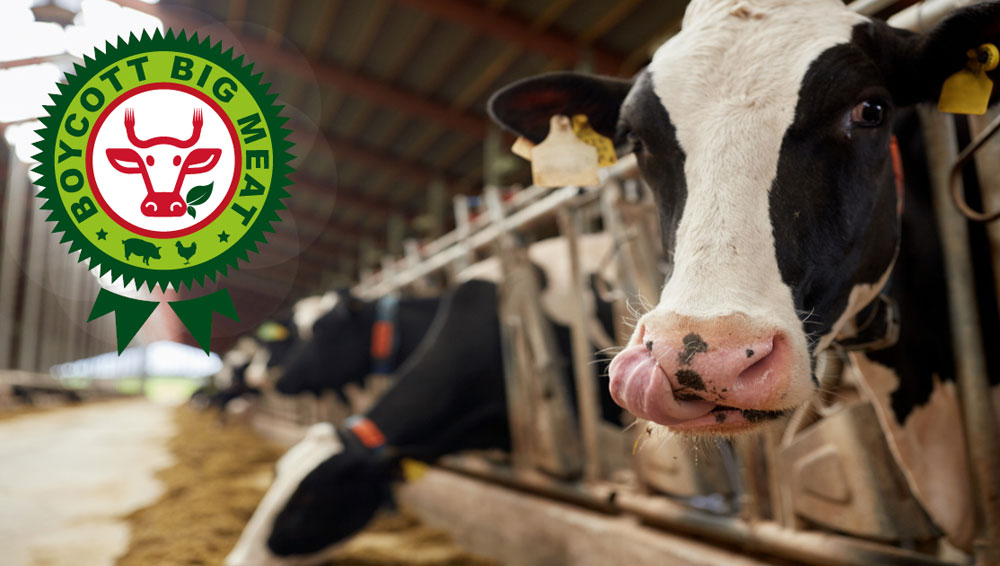
July 14, 2020; Public News Service, Vox, and Washington Post
A campaign calling for the boycott of industrial factory farming has been launched to support legislation in Congress that seeks to reform how the US produces its meat. Endorsed by a coalition of more than 50 food, environmental, and climate justice groups, the #BoycottBigMeat campaign was launched in Iowa to highlight the systemic problems of mass production of one of the costliest and most polluting food industries in the country.
Led by the Organic Consumers Association (OCA), Forward Latino, Socially Responsible Agricultural Project (SRAP), and US Farmers & Ranchers for a Green New Deal, the campaign was launched to nudge legislation that would essentially place a moratorium on concentrated animal feeding operations (CFOS) or factory farms.
Dubbed the Farm System Reform Act of 2019 and cosponsored by Senators Cory Booker (D-NJ) and Elizabeth Warren (D-MA), the proposed bill provides for a slow transition from animal industrial farming to smaller operations that promote pasture-based livestock. It seeks to phase out confined animal feeding operations by 2040 and strengthen the Packers and Stockyards Act of 1921 to protect small farmers from unfair contracts and transfer liability to large meat plants for their industry-generated pollution.
Booker, who is a vegan, was greatly influenced during his presidential campaign in Iowa upon hearing of the unfair practices of large meat factory monopolies toward small farmers, who were forced to sell their animals at low prices to one centralized buyer. Conversations with rural conservative farmers inspired him to work on this legislation.
By targeting large animal factory monopolies, the #BoycottBigMeat coalition anticipates a threefold strategy of advancing sustainable farming, climate justice, and workers’ rights.
As we’ve previously reported at NPQ, slaughterhouses became one of the main hotspots and spreaders of the coronavirus pandemic, affecting rural communities that had become economically dependent on these industries (but weren’t necessarily better off). A report by the CDC earlier this month identified 16,233 cases in 239 facilities in meat and poultry processing facilities, with a 87 percent incidence among Latinx, Black, and Asian workers. A mapping of coronavirus cases provided by the Food and Environment Reporting Network places that number even higher at 35,000 meatpacking workers.
Faced with interrupted meat chain production, many plants were forced to close at the beginning of the pandemic, leading the Trump administration to issue a directive to declare slaughtering and processing plants “critical infrastructure,” without regard to the workers’ lives. It did so under pressure from a lobbying powerhouse of five meatpackers—Tyson Foods, Cargill, Brazilian-owned JBS, National Beef, and Chinese-owned Smithfield—that control 80 percent of the mass production and spend more than $4 million a year on lobbying.
Based on CDC’s report, workers’ rights groups filed a racial discrimination complaint Monday against meat giants Tyson Foods and JBS for failing to prevent a coronavirus outbreak in their facilities and violating the Civil Rights Act.
Sign up for our free newsletters
Subscribe to NPQ's newsletters to have our top stories delivered directly to your inbox.
By signing up, you agree to our privacy policy and terms of use, and to receive messages from NPQ and our partners.
“The USDA should not be giving money to companies that are clearly engaging in racial discrimination,” says Navina Khanna, director of the HEAL Food Alliance coalition, to the Washington Post, explaining that CFOS receive millions in subsidies every year.
Although the #BoycottBigMeat campaign and the HEAL Food Alliance civil suit are separate efforts, both respond to the need to curb unfair labor practices by the meat industry.
“We are witnessing the human cost associated with the profits of our nation’s largest meat processors,” says Darryl Morin, Forward Latino president, in a press release. “Predominantly people of color, these essential workers have the right to the same workplace protections most of us take for granted.”
Opposition to the Farm System Reform Act claims the price of meat will go up and limit consumer choice. However, Sherri Dugger, executive director of the Socially Responsible Agriculture Program, explained during a press conference that the cost of CFOS to communities is higher than any cost benefits from industrial meat production.
“Concentrated feeding operations bring adverse environmental impacts, like air, land, and water pollution,” Dugger says. “They present public health risks, and they cause social divisiveness. They pit neighbor against neighbor, farmer against farmer, and oftentimes, family member against family member.” What’s more:
In trade for these negative impacts of these operations on local communities, the products from these operations don’t stay in those communities. These animals come in, they’re raised to an appropriate weight, then they’re shipped off to an industrial-scale slaughterhouse to be distributed around the world. China, I believe, owns one in four pigs being raised in this country, so the US bears the negative impacts of these animals being raised here, but the food is shipped off to feed people in other lands. We’re left, quite literally, with the animal waste, the pollution, the public health, the environment, the quality of life impairments, and that’s it.
Large meat factories have indeed been struggling to improve their public image for years now as consumers seek more ethical and healthier options to feed their families. The pandemic exacerbated the vulnerability of our food source and uplifted the need for local, more dependable consumer choices.
“Consumer demand and policy reform must go hand-in-hand to level the playing field for independent diversified producers so they can provide a dependable and sustainable food Consumers deserve to know where their meat comes from, and farmers deserve a fair shot in the marketplace,” said Rep. Ro Khanna (D-CA), who introduced the House version of the Farm Systems Reform Act.—Sofia Jarrin-Thomas
Correction: This article has been altered from its initial form to more accurately reflect the information relayed by Ms. Dugger. NPQ regrets the error.













